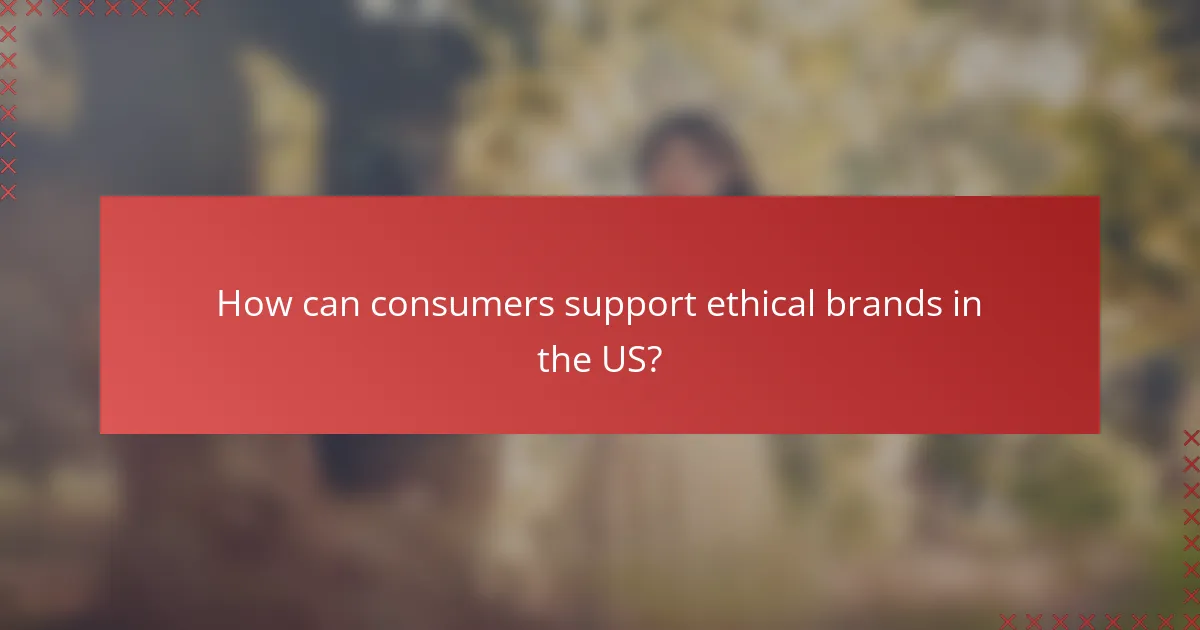Supporting ethical brands is a powerful way for consumers to make a positive impact on society and the environment. By prioritizing sustainability, fair labor practices, and social responsibility in their purchasing decisions, individuals can drive demand for products that adhere to ethical standards. This shift not only benefits communities and the planet but also encourages businesses to adopt more responsible practices, ultimately transforming the market landscape.

How can consumers support ethical brands in the US?
Consumers can support ethical brands in the US by making intentional purchasing decisions that prioritize sustainability, fair labor practices, and social responsibility. This involves choosing products from companies that adhere to ethical standards and contribute positively to their communities.
Choosing certified B Corporations
Certified B Corporations meet rigorous standards of social and environmental performance, accountability, and transparency. By purchasing from these companies, consumers can ensure their money supports businesses that prioritize ethical practices. Look for the B Corp logo when shopping to easily identify these brands.
Additionally, many B Corporations provide detailed reports on their practices, allowing consumers to make informed choices. This transparency can enhance trust and loyalty between consumers and brands.
Shopping from local artisans
Buying from local artisans supports small businesses and promotes fair wages within the community. Local artisans often use sustainable materials and practices, making their products more environmentally friendly. This direct support can help strengthen local economies and foster a sense of community.
Consider visiting local craft fairs, farmers’ markets, or online platforms that feature handmade goods. Engaging with artisans can also provide insight into their production processes and ethical commitments.
Participating in ethical marketplaces
Ethical marketplaces curate products from brands that adhere to fair trade and sustainable practices. By shopping at these platforms, consumers can easily find items that align with their values. Examples include websites that specialize in fair trade goods or eco-friendly products.
When using these marketplaces, check for certifications or reviews that confirm the ethical claims of the brands featured. This can help ensure that your purchases truly support ethical practices.
Utilizing eco-friendly packaging options
Choosing products with eco-friendly packaging reduces waste and supports brands committed to sustainability. Look for items packaged in biodegradable, recyclable, or reusable materials. This small change can significantly impact the environment over time.
When shopping, consider asking brands about their packaging practices. Many ethical companies are eager to share their commitment to reducing environmental impact, which can guide your purchasing decisions.

What are the benefits of supporting ethical brands?
Supporting ethical brands offers numerous advantages, including positive contributions to the environment, enhanced community welfare, and improved brand loyalty. By choosing to purchase from these brands, consumers can make a meaningful impact on society and the planet.
Positive environmental impact
Ethical brands often prioritize sustainable practices that reduce their ecological footprint. This can include using renewable resources, minimizing waste, and adopting eco-friendly production methods. For instance, brands that utilize organic materials or implement recycling programs help preserve natural habitats and reduce pollution.
Consumers can look for certifications such as Fair Trade or organic labels to identify brands committed to environmental sustainability. Supporting these brands encourages more companies to adopt similar practices, amplifying the positive impact on the environment.
Enhanced community welfare
Ethical brands frequently invest in their local communities by supporting fair labor practices and contributing to social initiatives. This can create job opportunities, improve working conditions, and foster economic growth in underserved areas. For example, brands that source materials locally often support small-scale farmers and artisans, helping to uplift entire communities.
By choosing to support these brands, consumers can contribute to a cycle of positive change, where profits are reinvested into community development and social programs. This not only benefits the community but also enhances the brand’s reputation as a socially responsible entity.
Improved brand loyalty
Consumers are increasingly drawn to brands that align with their values, leading to stronger brand loyalty. When customers support ethical brands, they often feel a personal connection and commitment to the brand’s mission. This loyalty can translate into repeat purchases and positive word-of-mouth referrals.
Brands that actively communicate their ethical practices and engage with their customers on social issues tend to build a loyal customer base. Companies should focus on transparency and storytelling to foster this connection, ensuring that their ethical commitments resonate with consumers.

How does supporting ethical brands affect the market?
Supporting ethical brands significantly influences the market by driving demand for sustainable products and altering consumer behavior. This shift not only encourages businesses to adopt ethical practices but also fosters a competitive landscape focused on sustainability and social responsibility.
Increased demand for sustainable products
The rise in consumer awareness regarding environmental and social issues has led to a notable increase in demand for sustainable products. Shoppers are increasingly seeking items that are eco-friendly, ethically sourced, and produced under fair labor conditions. This trend is evident across various sectors, including fashion, food, and personal care.
Brands that prioritize sustainability often see a boost in sales, as consumers are willing to pay a premium for products that align with their values. For instance, organic food sales have consistently outpaced conventional products, reflecting a growing preference for ethical consumption.
Shift in consumer purchasing behavior
As consumers become more conscious of their purchasing decisions, there is a marked shift towards brands that demonstrate ethical practices. This change is characterized by a preference for transparency, with shoppers increasingly researching brand values and supply chains before making purchases.
Many consumers now prioritize brands that actively engage in social and environmental initiatives, such as reducing carbon footprints or supporting local communities. This shift is reshaping marketing strategies, prompting brands to highlight their ethical commitments in advertising and product labeling.
Growth of ethical investment opportunities
The market for ethical investments is expanding as more investors seek to align their portfolios with their values. This growth is driven by the recognition that companies with strong ethical practices often demonstrate better long-term financial performance. Funds that focus on socially responsible investing (SRI) have gained popularity, attracting capital from investors who prioritize sustainability.
Investors can now choose from a variety of ethical investment options, including green bonds, sustainable mutual funds, and impact investing initiatives. These options not only support ethical brands but also contribute to positive social and environmental outcomes, making them appealing to a growing segment of the investment community.

What criteria should consumers consider when choosing ethical brands?
Consumers should consider transparency in sourcing, fair labor practices, and environmental sustainability measures when selecting ethical brands. These criteria help ensure that the products they purchase align with their values and contribute positively to society and the environment.
Transparency in sourcing
Transparency in sourcing means that brands openly share information about where and how their materials are obtained. This includes details about supply chains, the origin of raw materials, and the processes involved in production. Consumers should look for brands that provide clear, accessible information to build trust and accountability.
To assess transparency, check for certifications or reports that detail sourcing practices. Brands that are transparent often highlight their ethical sourcing on their websites or product labels, making it easier for consumers to make informed choices.
Fair labor practices
Fair labor practices ensure that workers involved in the production of goods receive fair wages and work in safe conditions. Consumers should prioritize brands that adhere to labor standards, such as those set by the International Labour Organization (ILO), which promotes decent work for all. This includes avoiding brands that exploit workers or rely on child labor.
Look for brands that provide information about their labor practices, such as employee benefits, working hours, and safety measures. Certifications like Fair Trade can also indicate a commitment to fair labor practices, helping consumers make ethical choices.
Environmental sustainability measures
Environmental sustainability measures refer to the actions brands take to minimize their ecological impact. This can include using renewable resources, reducing waste, and implementing eco-friendly production methods. Consumers should consider brands that actively work to protect the environment and promote sustainability.
To evaluate a brand’s sustainability efforts, look for eco-labels and certifications, such as Energy Star or USDA Organic. Additionally, brands that publish sustainability reports or set clear environmental goals demonstrate a commitment to reducing their carbon footprint and promoting a healthier planet.

How can brands effectively market their ethical practices?
Brands can effectively market their ethical practices by clearly communicating their values and commitments to sustainability and social responsibility. This involves using various strategies that resonate with consumers and build trust.
Utilizing social media storytelling
Social media storytelling allows brands to share their ethical journey in an engaging way. By using platforms like Instagram and Facebook, brands can post behind-the-scenes content, customer testimonials, and impactful visuals that highlight their ethical practices.
Brands should focus on authenticity and relatability in their stories. For example, a clothing brand could share stories about the artisans who create their products, showcasing fair labor practices and sustainable materials.
Engaging in community outreach programs
Community outreach programs help brands connect directly with their local communities while demonstrating their commitment to social responsibility. This can include sponsoring local events, organizing clean-up drives, or partnering with non-profits to support relevant causes.
Brands should choose outreach initiatives that align with their values and resonate with their target audience. For instance, a food brand might support local farmers by hosting farmers’ markets, thereby promoting ethical sourcing and community support.
Highlighting certifications and awards
Highlighting certifications and awards can enhance a brand’s credibility in the ethical marketplace. Certifications from recognized organizations, such as Fair Trade or B Corp, serve as proof of a brand’s commitment to ethical practices.
Brands should prominently display these certifications on their websites and marketing materials. Additionally, sharing awards received for sustainability efforts can further reinforce their ethical stance and attract conscious consumers.

What are some examples of successful ethical brands?
Successful ethical brands prioritize sustainability, fair labor practices, and transparency in their operations. Notable examples include Patagonia, which focuses on environmental conservation, and Ben & Jerry’s, known for its commitment to social justice and fair trade ingredients.
Patagonia
Patagonia is a leader in the ethical brand movement, emphasizing environmental responsibility and sustainable practices. The company uses recycled materials in its products and donates a percentage of its profits to environmental causes. Their “Worn Wear” program encourages customers to repair and reuse their gear, reducing waste.
Ben & Jerry’s
Ben & Jerry’s stands out for its commitment to social justice and sourcing fair trade ingredients. The brand actively engages in advocacy for various social issues, including climate change and racial equality. Their transparency about sourcing and production processes builds trust with consumers who value ethical consumption.
TOMS Shoes
TOMS Shoes pioneered the “one for one” model, donating a pair of shoes for every pair sold. This approach not only addresses the needs of communities in developing countries but also resonates with consumers who want to make a positive impact with their purchases. TOMS has expanded its mission to include mental health initiatives and access to safe water.
Warby Parker
Warby Parker revolutionized the eyewear industry by offering affordable, stylish glasses while maintaining a commitment to social responsibility. For every pair sold, they distribute a pair to someone in need. Their focus on direct-to-consumer sales allows for lower prices and greater transparency in the supply chain.
Allbirds
Allbirds is known for its eco-friendly footwear made from sustainable materials like merino wool and eucalyptus tree fibers. The brand emphasizes carbon neutrality and transparency in its manufacturing processes. Allbirds appeals to environmentally conscious consumers looking for stylish yet sustainable options.
